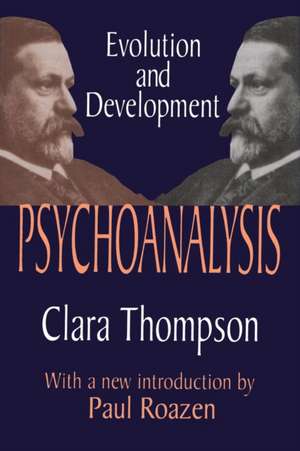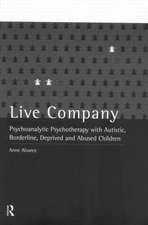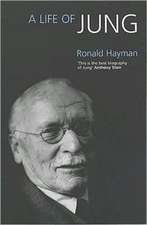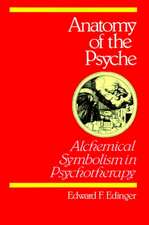Psychoanalysis: Evolution and Development
Autor Clara Thompsonen Limba Engleză Paperback – 31 oct 2002
Psychoanalysis has always been a theory of personality as well as a technique of therapy. Since Freud was born in 1856, and was an outstanding representative of the culture of old Vienna, Thompson thought there was plenty of room for revising classical analytic thinking in light of later developments. Such revisionism, she believed, need not lose the essential appreciation of the dynamic unconscious within classical analysis. However, Thompson felt Freud's biological outlook needed to be supplemented by a culturally more sophisticated orientation, and she was among those who tried to put Freud's concepts of libido into historical perspective. Instead of psychoanalysis having as its objective the release of tensions, Thompson proposed that the goal of analysis ought to be the growth of the total personality. Her revisionism also meant that the scope of psychoanalytic treatment could be broadened well beyond the neuroses Freud sought to explain. Thompson well understood the impact of the social environment on character formation.
The psychology of women needed to be rethought; differences between men and women could be partly explained by the social expectations that traditional Western culture had imposed on them. Thompson believed the whole analyst-patient relationship needed to be rethought; the real personality of the therapist has to be acknowledged, and the full human interplay between patient and analyst required examination.
In the current positivistic therapeutic climate based on technological advances in psychopharmacology, the ethical and humanistic dimension may be lost. Reflecting on the work of Clara Thompson and the neo-Freudian school can remind us of earlier efforts to challenge therapeutic authority and their distinct relevance to our problems today.
| Toate formatele și edițiile | Preț | Express |
|---|---|---|
| Paperback (1) | 412.57 lei 6-8 săpt. | |
| Taylor & Francis – 31 oct 2002 | 412.57 lei 6-8 săpt. | |
| Hardback (1) | 1000.27 lei 6-8 săpt. | |
| Taylor & Francis – 28 iun 2018 | 1000.27 lei 6-8 săpt. |
Preț: 412.57 lei
Nou
Puncte Express: 619
Preț estimativ în valută:
78.97€ • 85.81$ • 66.38£
78.97€ • 85.81$ • 66.38£
Carte tipărită la comandă
Livrare economică 21 aprilie-05 mai
Preluare comenzi: 021 569.72.76
Specificații
ISBN-13: 9780765809674
ISBN-10: 0765809672
Pagini: 272
Dimensiuni: 152 x 229 x 15 mm
Greutate: 0.37 kg
Ediția:Revised
Editura: Taylor & Francis
Colecția Routledge
Locul publicării:Oxford, United Kingdom
ISBN-10: 0765809672
Pagini: 272
Dimensiuni: 152 x 229 x 15 mm
Greutate: 0.37 kg
Ediția:Revised
Editura: Taylor & Francis
Colecția Routledge
Locul publicării:Oxford, United Kingdom
Cuprins
one: Introductory Survey; Two: Evaluation Of Freud’s Biological Orientation; Three: The Ego and Character Structure; Four: Unconscious Processes and Repression; Five: Resistance And Transference; Six: Theories About Anxiety; Seven: Freud’s Cultural Orientation Compared With Modern Ideas of Culture; Eight: Deviants Around 1912. Adler and Jung; Nine: Deviations and new Developments in the 1920’s; Ten: Recent Developments; Eleven: Therapy
Descriere
Clara Thompson was a leading representative of the cultural interpersonal school of psychoanalysis, sometimes known as the "neo-Freudians," which included Karen Horney, Erich Fromm, and Harry Stack Sullivan














